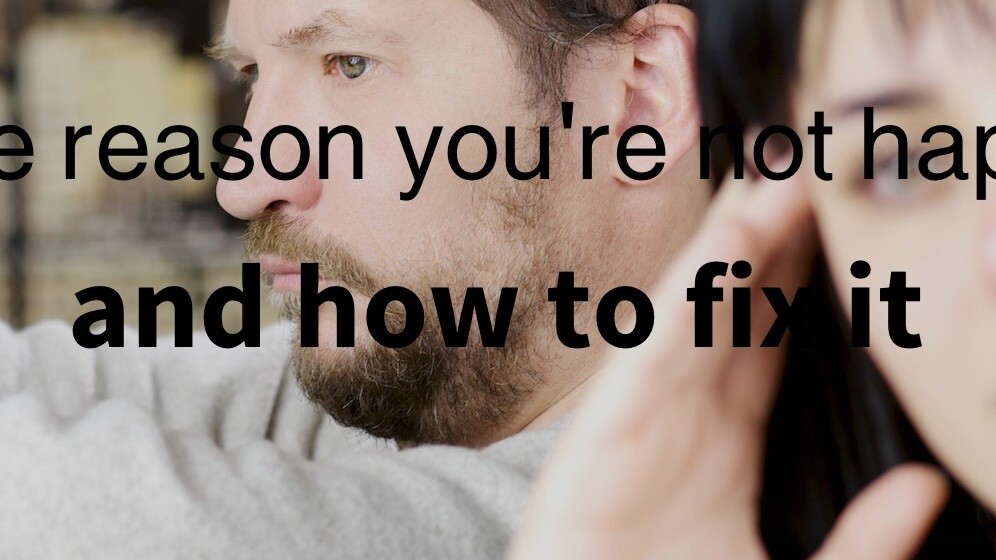
This post originally appeared on the Crew blog.
If only [blank], I would be truly happy.
We’ve all uttered that phrase at one point during our lives, right?
Whether we were kids hoping for that one Christmas present we really wanted or adults in search of that next promotion, we’re constantly in pursuit of that one thing that will make us happy.
When we finally get what we’ve spent so much time and effort searching for, we’re finally happy… at first. But you know what happens next. Inevitably, a week or two down the road we’re right back where we started looking for the next thing.
Researchers have a term for this cycle known as hedonic adaptation. We experience some positive change (new car, new toy, pay raise, etc), enjoy a momentary increase in happiness, and finally, find ourselves just as happy (or unhappy) as we were before the whole thing started.

Hedonic adaptation helps to explain why happiness is often so hard to come by. Better yet, looking at why we aren’t as happy as we expect sheds some light on exactly what can make us enjoy life more. Sonja Lyubomirsky, author of The How of Happiness, and colleagues created the Hedonic Adaptation Prevention model and identified several ways to increase happiness for good.
Experience more positive emotions and events
This might not come as a surprise, but positive emotions and events have been shown to slow hedonic adaptation. However, positive events are even more potent when they’re achieved in the right set of circumstances.
Perform acts of kindness
Remember those charity donations you made last year? It turns out they do more than remove the guilt of not donating and can actually boost your happiness.
Researchers gave a group of subjects a personal endowment fund of $128 and tracked their brain activity as each participant decided whether or not to gift their money to charity. The results showed that the “mesolimbic reward system [the part of the brain that links certain behaviors to a feeling of pleasure] is engaged by donations in the same way as when monetary rewards are obtained.” So giving actually brings as much pleasure as receiving.
These findings aren’t just tied to monetary donations, however. In another study, Lyubomirsky and colleagues found that simply performing five acts of kindness in one day led to sustained increases in happiness levels.
In general, acts of kindness go hand-in-hand with positive feelings. Donating money to a charity or helping someone in need makes us feel good about ourselves. Make these acts of kindness routine (more on exactly how later), and you’ll be on your way to happiness.
Pursue intrinsic goals
You’ve probably heard the terms ‘intrinsic’ and ‘extrinsic’ before. When you pursue a goal because you find the pursuit enjoyable, like running a 5k because it reduces your stress and gives you a rush of endorphins, that’s an intrinsic goal. Setting a goal of running to lose 20lbs and avoid humiliation at your high school reunion? That’s a perfect example of the extrinsic variety; you have your eye on the prize the entire time.
If you haven’t guessed it already, intrinsic goals are associated with more positive increases in happiness. Consider two scenarios:
- Jon enrolls in medical school to make his parents happy (they always envisioned him being a doctor) and to hopefully secure a job in a high-paying career field. He can’t wait for the six-digit salary and the weekends on the golf course.
- Theresa enrolls in the same medical school but for a completely different reason. She has always enjoyed helping others and loves to learn about medicine in general. She can’t wait to get in the lab and start learning.
Who is going to have a more enjoyable experience through medical school and their entire career? Theresa, of course. Since she enjoys the actual pursuit of becoming a doctor, she will have more positive experiences along the way.
With intrinsic goals, we experience pleasure during the pursuit rather than having to wait until the very end meaning we’re less susceptible to slipping back into our usual state after hitting an extrinsic goal.
Take a second look at your aspirations
“Shoot for the moon. Even if you miss, you’ll land among the stars.” The popular adage attributed to author Norman Vincent Peale certainly encourages us to dream big, but Lyubomirsky demonstrates that it’s also important to keep our aspirations in check.
In this context, aspirations refer to the hopes and desires we begin to expect after a positive change. For example, say you’re in your first year at a new company and you’ve heard of the large holiday bonuses they regularly give out, but your mind can only begin to fathom how magical it would be to get $5,000 extra at the end of the year. Low and behold, you have your year-end performance review and the boss gives you a $10,000 bonus. Your excitement would probably be hard to put into words!
Fast forward to next year. The end of the year is quickly approaching, and you can hardly wait to find out what your holiday bonus will be. The $10,000 last year paid for that amazing vacation in Hawaii. Your balloon of excitement is quickly deflated when the boss indicates he can only give you $5,000 this year.
What the heck happened? A year ago, you were overwhelmed at the thought of $5,000. Now, you’re disappointed it isn’t more. Lyubomirsky and her colleagues explain:
“…higher aspirations speed up adaptation because as they increase, people need more positive events and emotions just to maintain their original level of happiness.”
In short, as we achieve more, our expectations grow as well. When you were 16-years-old, you were overjoyed to get that clunker of a car with crank windows. As a 30-year old you probably wouldn’t have the same euphoria if someone gifted you a 1995 Saturn.
How do we avoid aspiration creep? Intrinsic goals come into play again. If you’re working at a job because you love the line of work you’ll be less focused on the end product (a large holiday reward). As a result, any kind of bonus will be an unexpected reward.
Practice appreciation
Mike Robbins’ future was bright when he was a high school senior. A baseball player his entire life, he was drafted by the New York Yankees but ended up turning down the offer and instead played for Stanford in college before eventually being drafted by the Kansas City Royals.
A few seasons into his minor league career he tore a ligament in his pitching arm effectively ending his baseball career. In his TED Talk on appreciation, Robbins reflects back on this life-changing moment, saying “the only regret that I had was that I didn’t appreciate it all as it was happening.”
Lyubomirsky mirrors this exact sentiment in a powerful line from her paper:
“If you are not aware of what you have, then it is as if you do not actually have it.”
Like Robbins, we so often take positive events in our life for granted and fail to appreciate them as they happen. We’re too busy looking forward to the next thing.
It likely won’t come as a surprise that appreciation is a key tenet of happiness. Appreciating a life change slows down adaptation, allowing people to sustain the boost in happiness from that change. It’s impossible to appreciate aspects of your life if you don’t take the time to acknowledge they’re there. Taking a moment out of your day to take stock of the amazing elements in your life can greatly boost your level of happiness. If you don’t know where to start, grab a journal and make a note of 1–3 things you’re thankful for each day.
Experience variety
Variety may be the spice of life, but it also plays a crucial role in your happiness. Take this scenario: you read that gratitude and appreciation help to increase happiness so every morning you write a gratitude letter to your significant other expressing a handful of items you’re thankful for.
At first, you’ll feel like the champion of happiness. Going from zero letters a week to writing every day will certainly cause a momentary boost in happiness. However, as you might expect, each subsequent letter will result in less and less of a boost. Your marginal benefit of expressing gratitude is decreasing with frequency.
As you write more letters each day (x-axis), the utility you receive from those letters (y-axis) decreases. Lyubomirsky offers some options for experiencing variety while simultaneously being consistent:
- Have several activities going at once. It takes longer to become bored when you’re focusing on a variety of activities. Rather than committing to help out at your local charity five nights a week, commit to one and pick another area where you can devote your now-available time.
- Vary how you accomplish the same activity. Let’s say you’ve set your intrinsic goal of getting fit because you love the feeling you get after a great workout. While increasing fitness is the overall goal, you can mix-up the way it’s accomplished by taking different classes and choosing difference exercises.
- Alternate activities. On the topic of happiness, this could mean practicing gratitude for a few weeks and then switching to acts of kindness. By constantly switching back and forth, your mind has less of a chance to adapt to one or the other.
One important takeaway: the focus on variety should be based on experiences, not material items. Buying a different shirt every week doesn’t lead to the same benefits. You’ll experience a more sustained increase in happiness when you meet someone new or learn a new skill than when you interact with a material item.
Notice anything missing from the list above? None of the strategies mentioned involve salary increases, material possessions, or many of the other habits we subconsciously equate with happiness and success. Each of the four habits responsible for increasing our happiness has the exact same financial barrier to entry — $0.
The path to happiness is paved with simple habits, not dollar signs and fancy cars.
Read Next: Demystifying the muse: 5 creativity myths you need to stop believing
Get the TNW newsletter
Get the most important tech news in your inbox each week.








